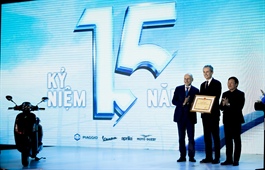Domestic car market sees sluggish sales in year-end sale season
Domestic car market sees sluggish sales in year-end sale season
While normally a positive time for car sales, this year the domestic automobile market is seeing gloomy days as Tet approaches, according to local car experts.

The sluggish sales are attributed to a tightening credit market, higher interest rates and stagnant real estate and stock markets. Few people have money to buy cars so those who are looking at this time must really have a need and enough money.
Nguyen Van Thang, an owner of a car dealership on Le Van Luong Street, said most banks do not give priority to car loans while interest rates are quite high. This factor greatly affected the car market in general and used cars in particular, especially luxury and expensive ones.
In November, many car models saw slight increases in prices due to rising input costs, logistics, and exchange rates. However, car traders had to reduce prices in early December due to sluggish sales.
Nguyen Van Nam, sales manager of a Hyundai showroom in Ha Noi, said that in December, he lowered prices by between VND15-30 million (US$625-1,250) of popular Hyundai models such as Accent, Grand i10, and Elantra.
Le Thai Son, a car salesman at a Honda showroom in Cau Giay District, said the prices of many Honda models were reduced, for instance, the Honda CR-V at this time would get an attractive discount of between VND70 million-90 million.
According to a survey, most car manufacturers are offering good discounts. For instance, Toyota Vietnam has offered a promotion campaign for models such as Veloz, Vios, or the 7-seat MPV segment with discounts of between VND30-40 million. Meanwhile, many dealers also have launched promotions by offering free registration or direct discounts on price.
No customers, no business
Despite racing to slash selling prices or launching promotion campaigns, the local car market has remained quiet.
Tran Duc Hung, a Ha Noi resident who is planning to purchase a vehicle, found himself wondering whether he should opt for a new car or not. Hung said that if he bought a new car, he would have to borrow about VND400 million ($16,666) from a commercial bank for a term of five years.
With this loan, Hung has to pay an amount of nearly VND6.7 million monthly, of which VND4.5 million was interest. Once his debt was paid off, his car would end up costing an additional VND130 million due to bank interest.
Sales manager of a Hyundai showroom Van Nam said since the end of the second quarter this year, car loans from commercial banks have had an interest rate of 13-15.5 per cent a year, while car loans during the COVID-19 pandemic were between 9.5 and 9.9 per cent a year.
Car loans offered by foreign banks in Viet Nam are between 10-11 per cent per year, however, lending procedures are very strict, and borrowers must have high incomes and their salary must be paid via banks.
Nam said his showroom’s car sales have decreased by about 40 per cent from the beginning of this year. His showroom set a target of selling 200 units in December, but it has been hard to achieve it.
Frozen used car sales
Meanwhile, used car sales have been gloomier, said Dinh Hung, a car trader. Since he started trading used cars, this has been the bleakest time. Hung attributed his slow sales to higher interest rates and tightening credit. He complained that he had to borrow money from banks for his business, and it was very difficult to pay off his loans as his used cars have gone unsold. In addition, manufacturers are offering attractive discounts for new cars.
Sharing the same view, car dealer Nguyen Quyet said in the first months of this year, the used car market was boisterous and many used vehicles were even sold at higher prices than new cars due to global supply shortages. Contrary to early months, the year-end used car market is quite gloomy. Meanwhile, Quyet still has to pay salaries to his staff, rent payment and bank interest, and sell vehicles at a loss.



























